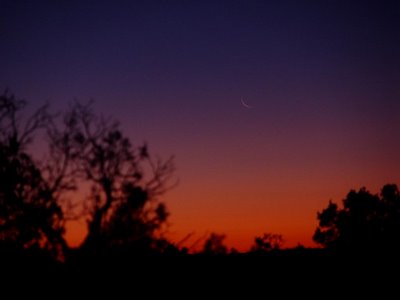New Astronomy Equipment Means Cloudy Skies
It's that time again... time when budding and experienced astronomers alike have a bunch of new equipment that they're dying to test out. This time, however, corresponds directly with the time when skies are most likely to be cloudy... winter.
If you're like me, you have recently acquired some new astronomy equipment. Be it a telescope, eyepiece, filter, camera, or other such attachment. You're dying to get out and see what it can do under the darkest of skies. Winter, in some respects, is an ideal time to observe. It gets dark really early and stays dark until mid morning. However, a number of things need to line up before you can take advantage of this long dark spell. First and foremost, skies are far more likely to be cloudy in the winter than they are in the summer... or any other time of year for that matter. Secondly, even when skies are clear, this tends to lead to winters second draw back... its just plain cold in the winter. Sometimes, really cold.
So, what's an astronomer to do? Well, rest up :) Seriously. I've missed a couple of the few clear nights because I was simply too tired to head outside for the evening. You definitely want to make sure that this happens as rarely as possible. Additionally, update your list of online resources :) Sometimes, we need to get our astro-fix vicariously. Skies are always clear... somewhere. Someone is always feeling well rested and able to get out. Following is a list of a handful of sites that I like to visit whenever I need to have the itch scratched:
www.SpaceWeather.com
Astronomy Picture of The Day
Gemini Observatory
www.AdventuresInAstrophotography.com
Robert Gendler
Al Kelly
Another thing you might want to do is become active in your community's planning process. Light pollution is spreading rapidly and there are fewer and fewer dark sky locations to be found. Some people have to drive more than a day to get under truly dark skies. This is simply unacceptable. Checkout www.TheLightingPolice.com for some truly bad examples of outdoor lighting. The Lighting Police are working to reduce light pollution one bad installation at a time. If astronomers won't work to protect our night skies, who will?
If you're like me, you have recently acquired some new astronomy equipment. Be it a telescope, eyepiece, filter, camera, or other such attachment. You're dying to get out and see what it can do under the darkest of skies. Winter, in some respects, is an ideal time to observe. It gets dark really early and stays dark until mid morning. However, a number of things need to line up before you can take advantage of this long dark spell. First and foremost, skies are far more likely to be cloudy in the winter than they are in the summer... or any other time of year for that matter. Secondly, even when skies are clear, this tends to lead to winters second draw back... its just plain cold in the winter. Sometimes, really cold.
So, what's an astronomer to do? Well, rest up :) Seriously. I've missed a couple of the few clear nights because I was simply too tired to head outside for the evening. You definitely want to make sure that this happens as rarely as possible. Additionally, update your list of online resources :) Sometimes, we need to get our astro-fix vicariously. Skies are always clear... somewhere. Someone is always feeling well rested and able to get out. Following is a list of a handful of sites that I like to visit whenever I need to have the itch scratched:
www.SpaceWeather.com
Astronomy Picture of The Day
Gemini Observatory
www.AdventuresInAstrophotography.com
Robert Gendler
Al Kelly
Another thing you might want to do is become active in your community's planning process. Light pollution is spreading rapidly and there are fewer and fewer dark sky locations to be found. Some people have to drive more than a day to get under truly dark skies. This is simply unacceptable. Checkout www.TheLightingPolice.com for some truly bad examples of outdoor lighting. The Lighting Police are working to reduce light pollution one bad installation at a time. If astronomers won't work to protect our night skies, who will?

